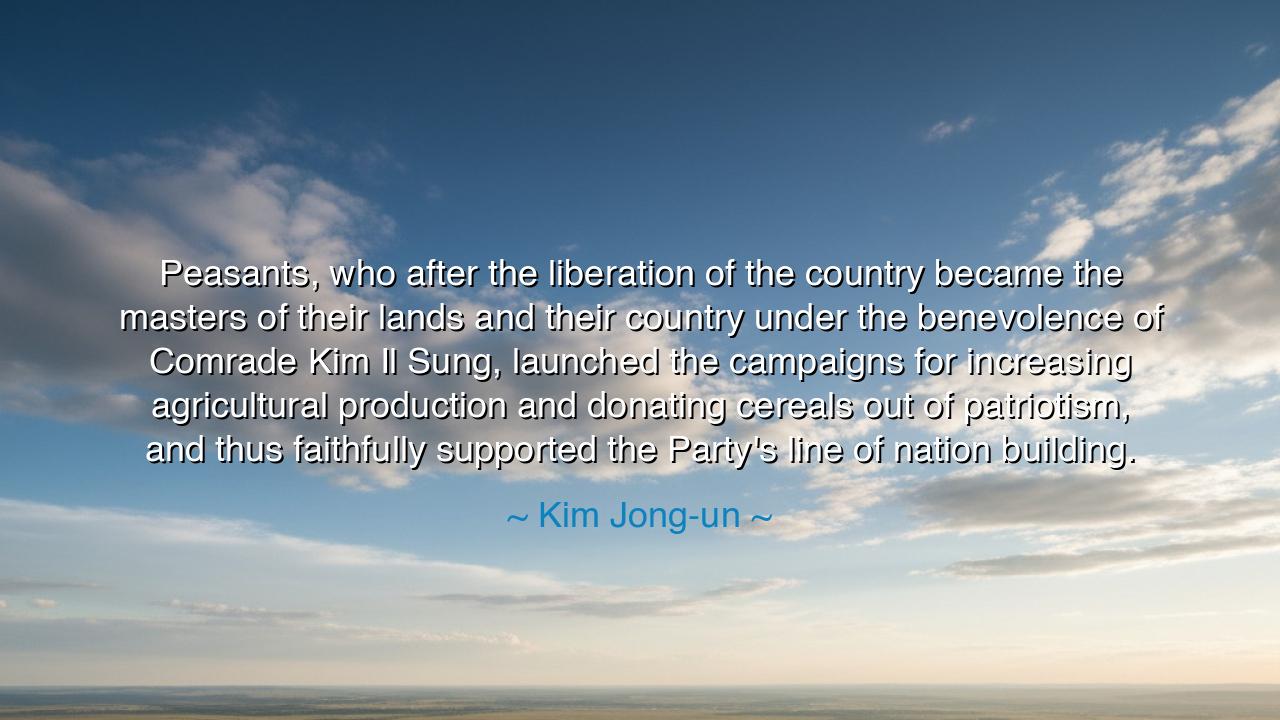
Peasants, who after the liberation of the country became the
Peasants, who after the liberation of the country became the masters of their lands and their country under the benevolence of Comrade Kim Il Sung, launched the campaigns for increasing agricultural production and donating cereals out of patriotism, and thus faithfully supported the Party's line of nation building.






“Peasants, who after the liberation of the country became the masters of their lands and their country under the benevolence of Comrade Kim Il Sung, launched the campaigns for increasing agricultural production and donating cereals out of patriotism, and thus faithfully supported the Party’s line of nation building.” So speaks Kim Jong-un, exalting the toil of the humble farmer, whose sweat and devotion laid the cornerstone of a nation reborn. This saying is more than praise—it is a tale of transformation, where the lowly became sovereign, where the soil itself became the altar upon which loyalty and labor were offered.
The origin of this quote lies in the aftermath of struggle, when a people, long bound in hardship, found themselves suddenly free. To be a peasant in such a time was to awaken to new dignity. Where once the fields yielded grain for landlords or foreign powers, now they yielded sustenance for the people themselves. By proclaiming them masters of their lands, Kim exalted them from servants of another’s wealth to stewards of their own destiny. Thus, the liberation of land became more than political—it became spiritual, a rebirth of identity and pride.
Yet with freedom came responsibility. The campaigns for increasing agricultural production were not merely tasks of survival, but acts of devotion. Each sack of rice, each harvest of grain, was not only food for the body but fuel for the future. When the peasants gave their cereals as offerings, they gave not leftovers but the very lifeblood of their labor. To donate, in this sense, was to consecrate the fruits of one’s toil to the greater cause of the nation. This was patriotism in its purest form: not lofty speeches, but quiet, daily sacrifice.
History bears witness to similar acts of devotion in other lands. Recall the citizens of Britain during the Second World War, who endured rationing and scarcity, yet tilled their gardens under the “Dig for Victory” campaign. From window boxes to open fields, they sowed and harvested, turning personal labor into national resilience. Just as the Korean peasants gave their grain for nation building, so too did the British people transform their hardship into a weapon of survival. Both examples teach us that true patriotism is not measured by what one keeps, but by what one gives.
In the tone of the ancients, we must declare: the strength of a nation is not built only by generals, ministers, or kings, but by the hands of those who till the earth and shape the harvest. The Party’s line of nation building could not be sustained by ideals alone; it required roots in the soil, the labor of millions, the unity of people willing to turn sweat into sovereignty. To ignore the farmer is to forget the foundation of civilization itself, for without bread there can be no army, no school, no city, no state.
The lesson for future generations is clear: freedom without labor is hollow, and patriotism without sacrifice is empty. To be a true master of one’s land or destiny is not merely to hold it in name, but to cultivate it faithfully, to share its fruits generously, and to bind one’s personal gain to the common good. The spirit of the peasants is a reminder that progress arises when each person, however humble, becomes a pillar of the whole.
Practical actions flow from this wisdom: work diligently in the sphere where fate has placed you, whether it be field, workshop, classroom, or office. Do not hoard the fruits of your labor, but seek ways to dedicate them to the prosperity of your community. Give not grudgingly, but with the spirit of patriotism, knowing that the strength of the whole depends on the sacrifice of the one. In this way, each citizen becomes a builder of the nation, and each moment of labor becomes an offering to the future.
Thus, remember always: the peasants, once bound, became masters through their labor, their patriotism, and their faith in nation building. Their story is not only history, but a guiding star for all who wish to see their people flourish. Let their example teach us that greatness is born not from what is taken, but from what is given.






AAdministratorAdministrator
Welcome, honored guests. Please leave a comment, we will respond soon